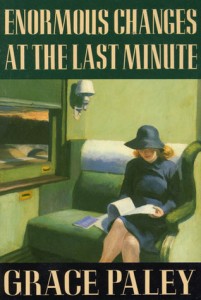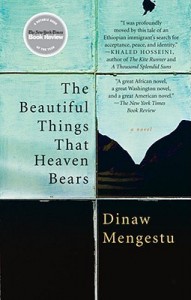In Like the Sun in Storm, a poetry collection, Ralph Salisbury uses relatively simple language to conjure images that are anything but. The title poem was one of my favorite in the collection. I’m still so wrapped up in the clean description of a child’s hiding place and the safety and hope embodied therein that I can’t translate the extraordinary feeling to the page. Instead, I’ll share two other favorite excerpts.
Enmity in “End of a War”
“The widows, who’d prayed we’d be shapes
burned into brick by a weapon broken into myth
saw us as skeletons
garbed in their husbands’ flesh” – Ralph Salisbury
This poem takes place in Nagasaki at the end of World War II. It recalls people who were vaporized by the atom bombs we dropped on Japan—leaving only shadows of their existence “burned into brick.” There are so many ways Salisbury could have talked about the horror of war. He could have described the effects of the bombs on Hiroshima and Nagasaki or he could have written about the confusion in Pearl Harbor as the Japanese bombed us.
Instead, this first-person, boots on the ground account of how the survivors reacted to his band of soldiers conveys both individual torment and a sense of mutual responsibility. I felt revulsion at the damage done by a weapon we created, but Salisbury also raised my guard with the enmity in those widows’ eyes. They were out to destroy us too.
The concrete imagery of the body in this passage evokes the human cost of war. It also allows the more ephemeral phrase, “weapon broken into myth” to stand apart. Well after I first read this poem, I was still thinking about the aura of myth around the atom bomb—how it creates almost Biblical destruction and how we talk about it so casually.
The poem as a whole creates a very personal and a very complex view of war—one I will be thinking about for a long time to come.
Family Meets Technology in “Awakened by Cell Phone”
“I hear the lovely and loving chatter
my daughter’s year old daughter sends
through silicon crystals
transmitted into eons of green
metamorphosed into petroleum
reborn as plastic, and, yes, into the centuries
of families which formed my ear.” – Ralph Salisbury
Here again Salisbury plays two sentiments against one another. He begins with the warm intimacy of family—the uncomplicated love of a grandparent for a grandchild. Then he makes a surprising segue to a thoughtful deconstruction of this wondrous technology that binds us. Though the language here is a bit more flowery than in the previous poem, the images are equally straightforward. My favorite part about this passage is how he returns to the human connection at the end.
I am not a poet, but even I could appreciate Salisbury’s carefully constructed language. The book overall spans World War II and familial love as you’ve seen here. It also speaks to the wars in Vietnam and Iraq, being Cherokee in Amish country, and the more complex sides of family relationships. It’s worth reading this book to understand how these diverse topics coalesce under the mastery of one voice.
I’m planning to re-read Like the Sun in Storm to learn about line breaks from Salisbury as I consider writing some poetry of my own. I’ll also enjoy (and learn from) the layers of nuanced emotion he creates on the page.
What poets do you read and what have you learned from them?

 Nearly every review you read about Dora: A Headcase begins with some version of the following phrase, “contemporary coming-of-age story based on Freud’s famous case study.” If I had known this, my reading of the book might have been more nuanced. But I didn’t. I went to the store in search of Yuknavitch’s memoir, The Chronology of Water, which I was unable to find. What they did have were several copies of Dora. I like the serendipity of discovering a book, so I bought and read this one without considering the back cover or the introduction. I may have missed a dimension of the book in doing so, but it didn’t dampen my enjoyment.
Nearly every review you read about Dora: A Headcase begins with some version of the following phrase, “contemporary coming-of-age story based on Freud’s famous case study.” If I had known this, my reading of the book might have been more nuanced. But I didn’t. I went to the store in search of Yuknavitch’s memoir, The Chronology of Water, which I was unable to find. What they did have were several copies of Dora. I like the serendipity of discovering a book, so I bought and read this one without considering the back cover or the introduction. I may have missed a dimension of the book in doing so, but it didn’t dampen my enjoyment. Jamie Ford’s Hotel on the Corner of Bitter and Sweet showcases a very different but equally real Seattle. Set primarily in the International District during World War II, the book tells the story of Chinese-American Henry and Japanese-American Keiko and a love that could not be.
Jamie Ford’s Hotel on the Corner of Bitter and Sweet showcases a very different but equally real Seattle. Set primarily in the International District during World War II, the book tells the story of Chinese-American Henry and Japanese-American Keiko and a love that could not be. As 2012 closes and 2013 dawns, it seemed a good time to enter the fray on a popular discussion: will e-books be the death of paper books? I’m a confirmed Luddite (no dedicated e-reader yet, though I do finally have a smart phone) and I love my paper books, but even I have to admit e-books present exciting new opportunities. In the right hands, e-books have come a long way from the poorly-formatted and typo-ridden uploads we came to expect in the early Kindle and Nook days.
As 2012 closes and 2013 dawns, it seemed a good time to enter the fray on a popular discussion: will e-books be the death of paper books? I’m a confirmed Luddite (no dedicated e-reader yet, though I do finally have a smart phone) and I love my paper books, but even I have to admit e-books present exciting new opportunities. In the right hands, e-books have come a long way from the poorly-formatted and typo-ridden uploads we came to expect in the early Kindle and Nook days. One of the things I like most about a book is the possibility of completely inhabiting a new culture or rediscovering a familiar one. Dinaw Mengestu gave me that gift this morning in the novel The Beautiful Things That Heaven Bears by allowing me to explore DC and Addis Ababa through the eyes of his narrator, Sepha.
One of the things I like most about a book is the possibility of completely inhabiting a new culture or rediscovering a familiar one. Dinaw Mengestu gave me that gift this morning in the novel The Beautiful Things That Heaven Bears by allowing me to explore DC and Addis Ababa through the eyes of his narrator, Sepha.